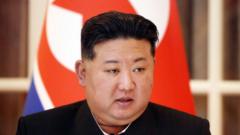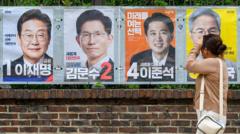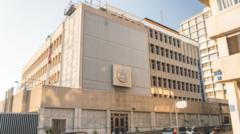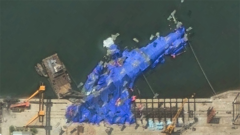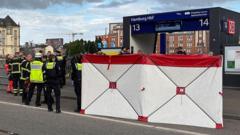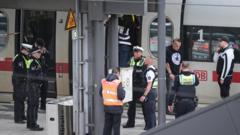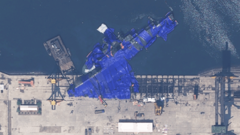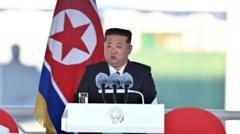**In a rare public response to a domestic accident, North Korea's leaders are being held accountable for a failed warship launch that has drawn sharp criticism from Kim Jong Un, reflecting the regime's military ambitions.**
**North Korea's Leadership Faces Reckoning After Warship Launch Mishap**
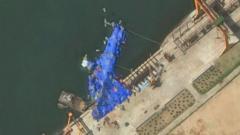
**North Korea's Leadership Faces Reckoning After Warship Launch Mishap**
**State media reports on the arrest of key officials following a failed warship launch, signaling Kim Jong Un's drive for accountability.**
In a surprising turn of events, North Korea has detained a senior official in connection with the disastrous launch of a new warship, which has drawn the ire of leader Kim Jong Un. Ri Hyong-son, the deputy director of the ruling Workers' Party's Munitions Industry Department, has been labeled largely responsible for the "serious accident" that occurred last week, as reported by state-run KCNA. The 5,000-ton destroyer tipped over during its launch, leading Kim to characterize the incident as a "criminal act" that has tarnished the nation’s dignity.
The ship is currently undergoing repairs, supervised by an expert team as indicated by KCNA. The arrest of Ri marks the highest-level accountability for the incident, emphasizing the significance of the event within the regime's military hierarchy. Along with Ri, three other officials at the Chongjin shipyard, where the vessel was constructed, have also been taken into custody: the chief engineer, the construction director, and an administrative manager.
Kim has stated that the failed launch resulted from "absolute carelessness and unscientific empiricism." While the potential consequences for the detained officials remain ambiguous, North Korea’s history suggests that those deemed responsible may face severe punishment, including forced labor or more extreme measures.
This incident is notable as such accidents are typically kept under wraps by the North Korean government, making the public acknowledgment of the failure a rare occurrence. Analysts interpret Kim's quick and harsh reaction as a message of Pyongyang's determination to strengthen its military capabilities despite setbacks.
Chun In-bum, a former commander of South Korea's special forces, noted that the open criticism from state media could indicate a shift in North Korea's confidence, suggesting that the regime is intent on advancing its naval power, potentially challenging South Korea's sovereignty. Michael Madden, an expert on North Korea at the Stimson Center, posits that the mishap could stem from internal pressures on military and production units, highlighting the regime's commitment to military modernization.
The recent failure follows the unveiling of a similar warship just weeks prior, which Kim praised as a significant leap forward for the North Korean navy, anticipating its deployment in the near future.
The ship is currently undergoing repairs, supervised by an expert team as indicated by KCNA. The arrest of Ri marks the highest-level accountability for the incident, emphasizing the significance of the event within the regime's military hierarchy. Along with Ri, three other officials at the Chongjin shipyard, where the vessel was constructed, have also been taken into custody: the chief engineer, the construction director, and an administrative manager.
Kim has stated that the failed launch resulted from "absolute carelessness and unscientific empiricism." While the potential consequences for the detained officials remain ambiguous, North Korea’s history suggests that those deemed responsible may face severe punishment, including forced labor or more extreme measures.
This incident is notable as such accidents are typically kept under wraps by the North Korean government, making the public acknowledgment of the failure a rare occurrence. Analysts interpret Kim's quick and harsh reaction as a message of Pyongyang's determination to strengthen its military capabilities despite setbacks.
Chun In-bum, a former commander of South Korea's special forces, noted that the open criticism from state media could indicate a shift in North Korea's confidence, suggesting that the regime is intent on advancing its naval power, potentially challenging South Korea's sovereignty. Michael Madden, an expert on North Korea at the Stimson Center, posits that the mishap could stem from internal pressures on military and production units, highlighting the regime's commitment to military modernization.
The recent failure follows the unveiling of a similar warship just weeks prior, which Kim praised as a significant leap forward for the North Korean navy, anticipating its deployment in the near future.

